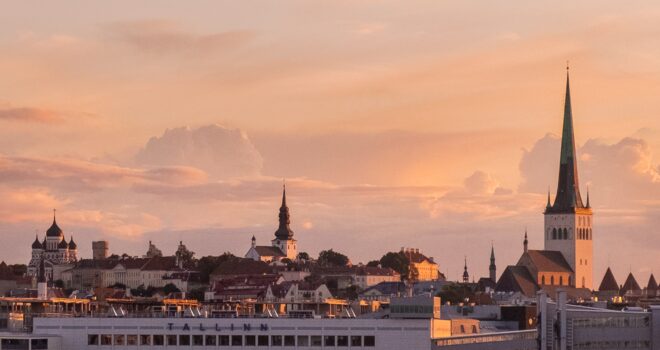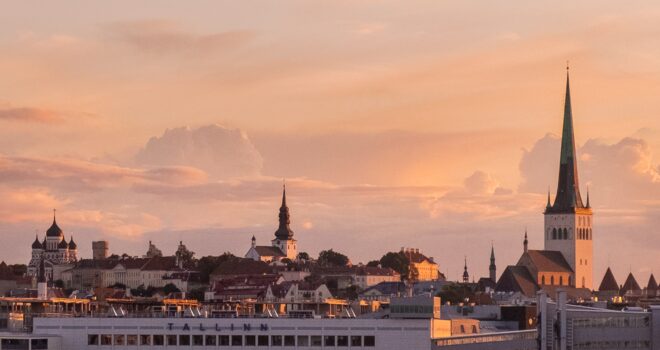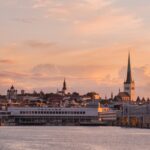During my second year in university, I was apathetic and aimless. Someone recommended praying that God would give me desires by which He would show me what to do. So, I did. And after weeks of this prayer, I acquired a keen desire to go to Estonia and serve the people there. Anything that is good must be from Him, so I believe my love for Estonia is from Him. “The Holy Spirit is random sometimes,” a local told me in Tallinn.
I have finally been to Estonia. But I only was there, at least this time, for four days. I stayed in Tallinn this past weekend as an American tourist, pilgrim, volunteer, artist, prospective resident, wanna-be surfer, adventurer, and huge fan. It was a lovely visit. I believe Estonia was in Jesus’ mind when He said, “make disciples of all nations.” But in this very short trip, I believe that Estonia has preached the Gospel more to me, has made me more of a disciple, rather than the other way around.
Estonia is one of the most atheistic countries in the world as well as one of the countries with the least exposure to religion over the past century. Nevertheless, the Gospel is not isolated from anyone. The grace of God offered to us by Jesus builds on our human nature, since He has become one of us. If our everyday actions are united to Jesus, they become means of divinization. He has united His Divinity to that which is broken, lowly, and human.
When we become members of the Body of Christ at Baptism, we share in the priestly, prophetic, and kingly roles of Jesus. This three-fold office, redeemed only in Jesus, is part of intrinsic identity given to us by God from the beginning, when God made humanity. I have seen this in Estonia.
In Estonia, I was met with priestly intercession. I experienced this chiefly from the faithful priests there offering up Jesus in the holy Eucharist every day. Thank you all, dear fathers! But I saw it also present in little ordinary interactions of life. Marge, the sole Estonian contact I had before I came, sacrificed so much of her time and attention on my behalf, providing detailed arrangement of my appointments and activities, from introducing me to the bishop, to arranging my volunteering opportunities at the Catholic school and at the Missionaries of Charity. Others acted on my behalf also: the friendly newspaper woman who helped me find the bus terminal; the parliament translator who generously gave me a personal tour of the capitol building; the Bridgettine who packed a sandwich for my journey home. People sacrificed for me, and people advocated on my behalf.
In Estonia, I was met with many proclamations of the truth. Not only in the readings of the Word of God at Mass (which I could not understand, being in Estonian)— but also in people speaking truth to me in unassuming conversations: the woman at the post-Mass social who shared how her conversion to Catholicism was because of Our Lady of Fatima; the chill teenagers who I spoke to in their English class, who shared with me their hopes of studying arts and sciences; the university student who conversed with me and complemented my art as I painted overlooking the city; the babushkas at the soup kitchen, who were delighted by my extremely limited Russian. We are all made to know and speak the truth.
In Estonia, I was met by a regal population. Everyone in the world has politics, family, and customs. In Estonia, there was a sense of sacred space: the windy sea cliffs, the majestic Old Town, and Kadriorg’s lively gardens and playgrounds. I could also see there is search for what is higher: in the architecture and history of palaces and parliament, in painful memories evoked in the KGB basement on Pagari street, in the joyful memories evoked in the Estonian Art Museum, and in the innovative progress of technologies. There are things in this life truly worthy of solemnity and Estonia recognizes this.
Priesthood, prophecy, and kingship— sacrifice, truth, and honor— are universals which I found in Estonia. When we travel, we are usually fascinated by what is unfamiliar. But in Estonia, I found what was dissimilar to be an accent mark, a magnification, an instance, of these aspects which are present everywhere. I found not an alien land, but my neighbors and family, in the universal Church and in the wilderness of Jesus’ lost sheep.
Someone in Tallinn, perceiving I was a foreigner, pointed out to me that I have “a different face” and it is true. This difference, however, reminds me of the sameness of our humanness and the beauty of our humanness. These are things we don’t habitually marvel at. But on the quiet bus rides from my residing place at the medieval Bridgettine convent to the gorgeous Old Town, I watched the faces around me, faces which are icons of Jesus Christ. I think of those that had become before us, who had also traveled on the same coast, long ago, in medieval times and, not so long ago, during the Soviet occupation. I feel like we do not know the depth of our connection with strangers on a bus, across the ocean, and of the past. I feel we should be more fascinated.
We can forget these things in the boring beat of our daily tasks or in the lingering stinging of sufferings. That is why I like to travel: it takes me out of my own little world and reminds me of the world revolving around me. To see and hear the St Michael’s School students play in the courtyard— right there in the midst of the apostolic ministry, the city, and the Eucharist— was like beholding the entire Church in miniature. Moments like this during my travels remove me from the preoccupations in my mind and help me to better recognize the omnipresence of transcendent realities, that I might better recognize them in the ordinary. So, thank you to everyone I met in Estonia: to Marge, Fr. Tomasz, Fr. Igor, Hedwig, Graham, Helga, Ann, Manuel, Merili, and to all you others, each and every one of you.
In the past, when people asked me what my plans are, I have often mentioned my desire to serve in Estonia or my desire to learn to surf. So, it was amusing when I noticed that there is a surfing school directly across the street from where I stayed in Tallinn. I think I can say with St Therese, “The good God had always made me want that which he wanted to give me.”
Estonia has reminded me that Jesus is present everywhere for us and that we are each intrinsically made for loving sacrifice, truth, and honor. It has also reminded me that sunsets are gorgeous and that I should watch them much more often. Thank you very much for reading, I hope doing so has reminded you of these too. May Our Lady of Terre Mariana always keep you company.
Photo by Julia Solonina on Unsplash












